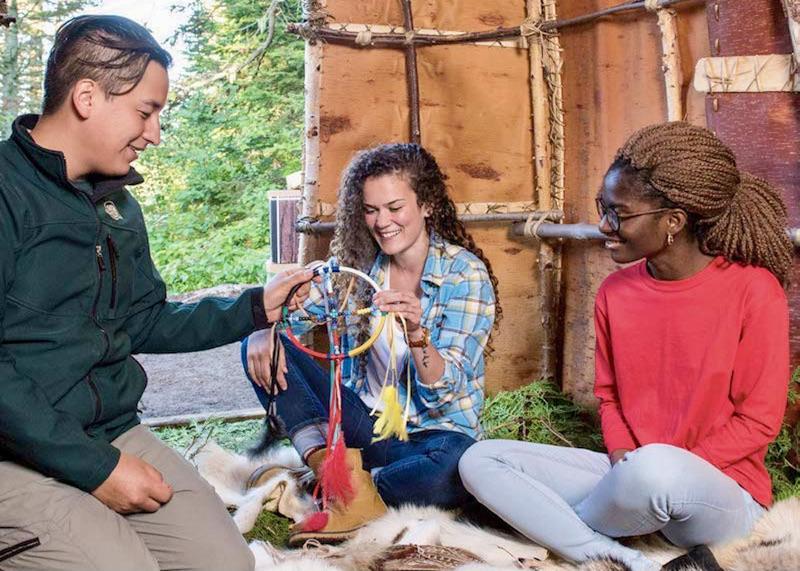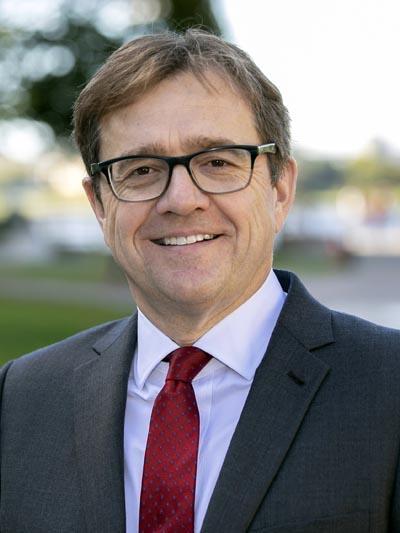
A trio of people at Pukaskwa National Park in Ontario. People of all backgrounds, cultures and traditions want to see themselves reflected in Parks Canada staff/Parks Canada, Scott Munn
Canadians wants Parks Canada to work harder to make racialized communities, Indigenous peoples, LGBTQ2+ communities and people living with disabilities feel welcome in its parks, conservation areas and historic sites.
That was a key takeaway of "Let's Talk Parks, Canada!" — the 2020 Minister’s Round Table on Parks Canada, a national consultation that’s held every two years to help shape the agency’s response to challenges like climate change and biodiversity loss.
The round table was delivered through virtual engagement sessions and an online engagement portal in October and November. It drew a record 4,500 emails and 20 written submissions, and attracted 60 organizations to nine virtual discussion forums. More than 500 ideas were shared through the online portal and 8,000 people were engaged over social media.

Jonathan Wilkinson is the federal minister responsible for Parks Canada.
“Getting outside has been indispensable to many of us during this difficult year, myself included,” Jonathan Wilkinson, Minister of Environment and Climate Change and Minister responsible for Parks Canada, wrote in his report and response to the round table. “COVID-19 has reinforced the need to ensure that all Canadians can access, enjoy and feel welcome in all natural and cultural heritage places.”
Wilkinson’s report details 12 action areas that “will help to protect more nature, strengthen Indigenous leadership in conservation, protect Canada’s built heritage, foster diversity in the stories shared at Parks Canada administered places and make these important places even more inclusive and welcoming to all visitors.”
Ron Hallman, president and CEO of Parks Canada, said the 2020 level of participation in the consultation process demonstrated how invested Canadians are in Parks Canada’s work to protect and share natural and cultural heritage places.
More than 13,000 Canadians weighed in on five themes — urban parks, diversity, inclusion and accessibility, ecological corridors, Indigenous leadership in conservation, and protecting cultural heritage.
The minister’s 12 action items promise that Parks Canada will:
• Review best practices and successful models for supporting urban parks and enhancing conservation efforts in urban areas.
• Explore options to expand urban parks in Canada and to support conservation in urban areas to increase access for Canadians to green spaces.
• Continue comprehensive efforts to promote diversity, inclusion and equity in visitor experience and outreach activities.
• Work with experts, as well as advocacy and service organizations, to strengthen accessibility and inclusion.
• Work with experts, partners and conservation organizations on an overarching approach to ecological connectivity.
• Promote the adoption of best practices for ecological connectivity into conservation planning across Canada.
• Convene Indigenous partners to advise on agency-led initiatives.
• Advance efforts to develop a framework for Indigenous stewardship in places the agency administers.
• Identify opportunities to support and advance Indigenous Protected and Conserved Areas.
• Work towards strengthening legislation related to the designation of places, persons and events of national historic significance and the protection of federally owned historic places.
• Explore opportunities to increase support to owners of historic places.
• Continue to implement the Framework for History and Commemoration: National Historic Sites System Plan 2019.

A child in a wheelchair enjoys Prince Albert National Park in Saskatchewan/Parks Canada, Ryan Bray
Participants repeatedly brought up the concept of “nothing without us,” or “the importance of ensuring that those affected by decisions and initiatives are integrally involved in their design, implementation and decision making.”
They wished for “ethical space” where multiple perspectives and world views are brought together and equally valued.
While considering barriers to diversity, inclusion and accessibility, people suggested helping low-income Canadians by making heritage places free and exploring subsidized transportation options.
Parks Canada “consistently heard that Canadians of all backgrounds, abilities and traditions need to see themselves `on both sides of the counter’ in order to feel welcome and included.” This extends from senior leadership to marketing and communications to front-line services.
Round table participants stressed the importance of reconciliation with Indigenous peoples and integrating Indigenous science in decision making. They reminded Parks Canada “of the devastating impacts that past decisions in the creation of national protected places have had for Indigenous peoples, who were often alienated and separated from their lands and cultures of part of the establishment process and ongoing management of these places.”

Three people explore the Fortress of Louisbourg National Historic Site in Nova Scotia/Parks Canada, DCBA
Parks Canada promised to consider options for expanding its network of urban national parks beyond Rouge National Urban Park in Greater Toronto, and to make partnerships to advance conservation in urban and near-urban settings. One participant noted that people “may go to urban parks because they’re convenient and accessible (especially to people without a vehicle), and offer a slice of nature in the hubbub of urban life. They’re a good place to spend an afternoon.”
These 12 actions, Wilkinson said, will help advance Canada’s efforts to protect 25 per cent of lands and waters by 2025. The agency will now develop detailed action plans to shape the next 24 months. This next two years of work will reported to the next round table in 2022.
Parks Canada protects a network of natural and cultural heritage places that includes 171 national historic sites, 47 national parks, five national marine conservation areas and one national urban park. It has more than 7,500 employees and logs 25 million visits per year while monitoring more than 200 species at risk and overseeing 7,000 kilometres of trails, 12,000 campsites and 31 million archaeological and historical objects.

 Support Essential Coverage of Essential Places
Support Essential Coverage of Essential Places



